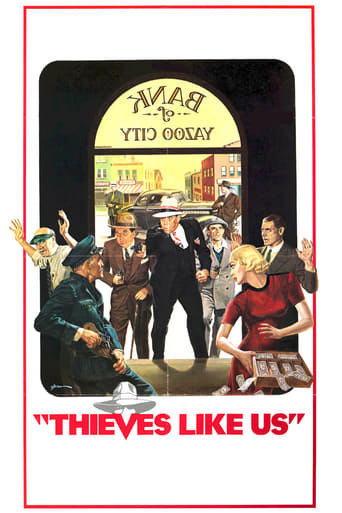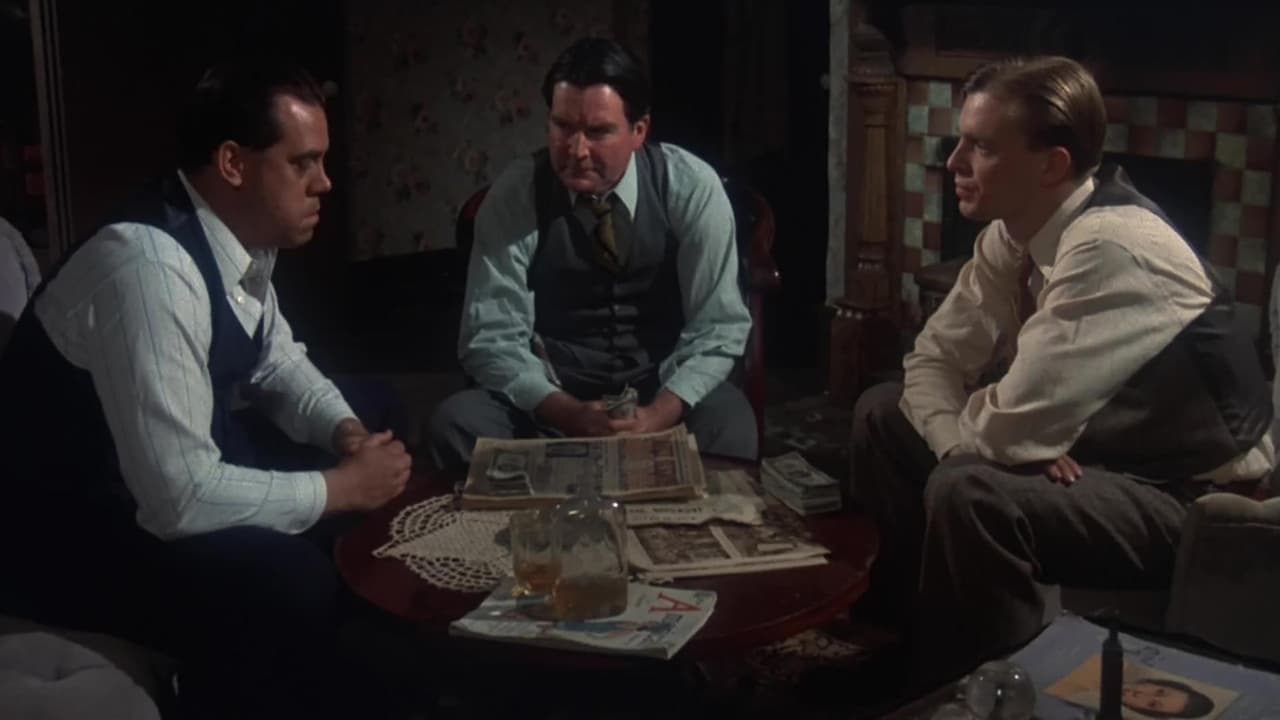runamokprods
A gentle, slow, and moving study of some none-too-bright bank robbers in the 1930s. Keith Carradine and Shelly Duvall are terrific, and their scenes together are alive and wonderful. Some of the surrounding acting and story lines are good, but not nearly as strong as the film's center. Beautiful production design, and a feeling, as with 'McCabe and Mrs. Miller', of both tremendous reality, of 'being there', while still somehow feeling Brechtian and ironic at the same time. There are moments where the radio music in the background -- used in place of score - is a bit on the nose, and a few moments feel forced or slow. But this is a unique, odd and special movie, examining thieves in the depression without any hint of glamorization on one hand, or forced empathy on the other, while still breaking our hearts.
bobsgrock
When watching Thieves Like Us, one will almost certainly get the feeling of deja vu in thinking back to the classic 1967 American film Bonnie and Clyde. Indeed, Altman's film owes a bit of gratitude to that picture as its success opened up the door for films like this to be made throughout the early 1970s. While some may claim Altman simply copied the successful formula of Bonnie and Clyde in adapting Edward Anderson's novel, I think the deft touch of Altman's style is pervasively present.In nearly all of Altman's films, the characters and their quirky individual idiosyncrasies are far more important than plot and exposition. This is especially true here as we come to really know and understand who these trio of thieves and their compatriots are while all but predicting exactly what will happen next. Altman could care less what happens to them and neither do we. What is more important is how they react. The acting is very helpful in this department, particularly with the leads of Keith Carradine and Shelley Duvall as Bowie and Keechie, who fall in love yet cannot seem to simply escape from the world in which they are trapped in.The supporting cast is also very good, particularly Louise Fletcher and Burt Remsen, but Altman's direction really steals the show as the most memorable part. He hardly ever uses close-ups, daring to get us to connect with these characters as we watch them commit robberies and shoot up the south. He also continues his progression in the sound editing department, using the radio as a thematic link for the whole film. Like the overhead announcement horns in MASH, the various programs and people heard on the radio give a different emotional and visual impact to what is happening in the scene (For example, when Bowie and Keechie first come together intimately, Romeo and Juliet plays over the radio).The only criticism I have of this film is that it too closely parallels that of Bonnie and Clyde, a much better and more engaging and challenging film. The originality isn't in the story but the characters; Altman's characters can't be found in practically any other type of movie. They are unique to his style and substance and soon you realize that is how it should be for it wouldn't work under anyone else.
Goodbye_Ruby_Tuesday
I really should not be writing this because of my huge bias and unabashed love for Nicholas Ray's film debut, which is adapted from the same novel as Altman's film, but I'm going to exercise my freedom of speech while I still have it.Robert Altman was a subtle, interesting and sorely missed director. He had an acute eye for visual style, how the camera moves, setting of the times, and above all, the way people really talk--anyone can see a huge influence on the Coen Brothers. The Depression era-South is so fully realized in the smallest details like a bare light bulb and the gray skies give a definite look to a sour period of American history. But at two hours long, this is not for the "Speed" generation. Ray's "They Live by Night" is so well-remembered by cult fanatics and film critics for its fast pace and contemporary camera moves, and at 90 minutes you never want it to end.Though ensemble casts are part of Altman's trademark, there never seems to be a center to the story, despite the love aspect. Ray gives you two naive kids hardened by their environments who you root for and are truly the beating heart of the movie. These two characters needed two actors to embody the frantic love-on-the-run, and Ray struck gold with Cathy O'Donnell and Farley Granger. You didn't need to do anything special to make the audience believe that these kids were so naive...they simply *were* the characters as much as the characters were them, with a mad-love that was truly convincing all the way through, their hardened outsides giving an edge to this otherwise by-the-book "Romeo and Juliet" story.Altman, on the other hand, tries too hard to convince you that these actors are playing virginal, innocent lovers. While trying to make a 25-year-old Shelley Duvall look younger she looks like she's 5. There never seems to be the slightest hint of genuine romance or longing or passion in this love story, and it falls flat where it should be the strongest part of the whole story. Take the scene where Bowie asks Keechie if she's ever had a boyfriend before: partly because of the censorship issues of the 1940s, Ray couldn't show anything too explicit, so the most sensual moment is Keechie lovingly massaging Bowie's hurt back. This creates both a hidden, sexual longing between these innocents and reflects Keechie's tender, motherly care for Bowie. In Altman's version, the two simply share Coca Colas while sitting opposite each other, without much energy in the air. This film contains nudity, but there is no sense of reason for any of it.While Altman is known for his subtlety, he lacks any of it here. One scene in particular hits you over the head with the notion that the story greatly parallels "Romeo and Juliet," during the sex scene, with radio broadcasts cut in between (and there are a lot of them in this movie, too) of a broadcaster saying something along the lines of, "We now return to the story of Romeo and Juliet...two tragic star-crossed lovers..." The jig is up, Altman. We get it.Endings can nearly make or break a movie; Given Altman's nearly satirical edge to all his other movies, it's maybe unsettling that he went too far in the opposite direction, and he does go overboard with Bowie's death scene. He brings out the big guns, so to speak, with a long, "Bonnie and Clyde"-style shootout (in fact, it's a near copy of Arthur Penn's classic movie ending) with slow-motion photography and Shelley Duvall's Wilhelm screams. It's manipulative because he tries too hard to force emotions that weren't there to begin with. To me, Altman held his characters at a distance whereas Nicholas Ray was hugging them tight the whole time, and his unrequited love for Bowie and Keechie is what makes his ending so powerful. It is quick, raw and unrelenting. Bowie is dead, and all that is left is Cathy O'Donnell glowing under a harsh light, finally realizing the true love they could never express in words.Altman claims to have never heard of or seen "They Live by Night" while he made "Thieves Like Us." It's too bad; he could've learned a thing or two from Ray's self-assured and poignant debut.
evanston_dad
"They Live by Night," the 1948 screen adaptation of the Edward Anderson novel "Thieves Like Us," and other films that have obviously been inspired by it, like "Gun Crazy" (1949) and "Bonnie and Clyde" (1967), have all been so good that it makes you wonder if yet another version of the same story is necessary. The answer is yes, because Robert Altman is behind this version, and if Altman proved nothing else as a director, he proved that he could take any material and make it his own.Altman's "Thieves Like Us" is a beautiful and heartbreaking version of the lovers-on-the-lam story, with Keith Carradine cast as Bowie, the soft spoken, sensitive member of a trio of escaped convicts and bank robbers (the other two, Chickamaw and T-Dub, played by Altman regulars John Schuck and Bert Remsen, respectively). During a lull in their series of robberies, Bowie sets up house with Keechie (Shelley Duvall), a shy, simple country girl, and they take a stab at a sort of domestic bliss despite the fact that Bowie is doomed and it's only a matter of time before the law catches up to him. Meanwhile, T-Dub's sister-in-law, Mattie (Louise Fletcher), who has helped the fugitives because of family obligations, begins to tire of the example the trio are setting for her own children, and becomes an accomplice to the police trying to track down the criminals.Previous screen versions of this story cast gorgeous actors as the lovers and made us fall in love with them. In 1948 it was Farley Granger and Cathy O'Donnell; in 1967 it was Warren Beatty and Faye Dunaway. We fall in love with Carradine and Duvall too, but for different reasons. They are decidedly NOT gorgeous actors -- they're both skinny, ungainly and awkward. But they're both incredibly simple and sweet, and they have some lovely and naturalistic moments together that make us wish these two could just settle down, have a family and achieve their own small share of happiness. Altman constantly reminds us of the happiness these two are denied through use of an endless parade of print and radio advertisements that serves as a running commentary throughout the film. During a horrible depression during which so many people could afford nothing, Altman seems to be accusing the American consumerist culture of incessantly reminding everyone of what they didn't have. The way to happiness, Altman implies, seemed to lie in material comforts; no wonder the trio of men in this film prefer robbing banks to the alternatives available to them.And there's another theme winding its way through Altman's version, one which appeared again and again in his work, that of frustrated male inadequacy. The men in this film turn to the most destructive behavior (thieving, drinking, sexual aggression) in order to cope with a world they feel they've lost control of, and this behavior is continuously juxtaposed to the feminine, domestic sphere represented by Mattie, eternally capable and resourceful, and resentful of the disruption the men bring along with them."Thieves Like Us" does not have that beautiful, ethereal sheen to it that characterized Altman's other early-1970s films, mostly because he did not use expert cinematographer Vilmos Zsigmond on this outing. But thanks to the winsome performances of Carradine and Duvall, and the touching representation of their characters' tentative relationship, this is one of his warmest and emotionally resonant films from that time period.Grade: A


 AD
AD




